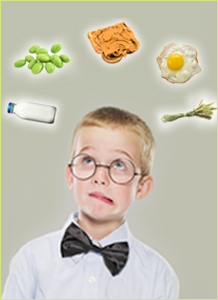These five steps can help you protect children with food allergies.
In most ways, Jason is your typical 5-year-old boy. He's energetic, playful, and full of life. But since he's allergic to eggs and tree nuts, he can't eat regular birthday cake at a child's party, can't go out for pancakes, and can't have much of the candy he collects on Halloween—all simple treats that many children enjoy. Because of his allergies, Jason's parents must ensure that he stays safe no matter where he is, and that he understands which foods he can and cannot eat. Most of all, they are always prepared in the event he eats something he shouldn't. Simply put, managing his food allergies has become a way of life for Jason and his family.
Cases on the rise
Food allergies are on the rise in the United States, affecting more than three million children under the age of 18, an increase of 18 percent since 1997. The most common allergic foods are cow's milk, eggs (white, yolks, or both), peanuts, and tree nuts (including almonds, walnuts, and pine nuts). Together with soy and wheat, these foods are responsible for roughly 90 percent of all food allergies in children. While milk and egg allergies are typically outgrown, peanut and tree nut allergies generally do not go away.
Reactions to peanut allergies can be especially severe, even fatal. Accidental exposure to foods that contain peanuts is a very common problem, since there are so many products that contain them or peanut products. "We've seen a tremendous increase in the number of peanut allergies in the last several years, for reasons that we cannot fully explain," says Donald E. Klein, M.D., a pediatric allergy specialist in Providence, Rhode Island. "But these allergies are very real, and parents need to take every precaution to avoid these foods."
What should parents do?
If you suspect your child has a food allergy, it's important to see your child's pediatrician. (Not all food reactions are allergies.) If your child does have a food allergy, take these steps to help protect your child at home, at school, or in any other social setting that involves food:
- Food avoidance is the best medicine. From a very early age, teach your child about the seriousness of the allergy and how sick he or she will be by eating certain foods. "Your best defense is to instill in your child to eat only what you give them or tell them is OK. Eventually, this will become second nature," says Dr. Klein. This may mean changes such as your child bringing his or her own cupcake to a friend's birthday party, but safety must come first.
- Carry medicine and be ready to use it. Always have two doses of your child's medicine with you at all times (typically an epinephrine pen, or EpiPen®), and be sure that you know how and when to use it if your child needs it. (Also keep a dose at relatives' homes and the child's day care or school.) If you have any questions about using the medicine, ask your child's doctor. Practice administering it with an auto-injector, which looks like the real thing but doesn't have a needle or medicine.
- Teach your child the signs of an attack. Make sure your child knows the warning signs of an allergic reaction (these may vary by child and allergy type), including:
- Tightness in the throat
- Hoarseness
- Difficulty breathing
- Hives
- Swelling
- Abdominal pain
- Make sure schools are aware and prepared. Once your child reaches school age, you won't be able to watch his or her every move. Make sure your child's school, and in particular the school nurse, is aware of his or her allergy(ies). Supply the school with a list of things your child cannot eat, an emergency contact, and instructions for administering the allergy medicine. Work with your child's doctor to put together an action plan in the event of an emergency.
- Read everything you can about ingredients. "You must become an expert on your child's allergy, and train yourself to be an educated label reader," says Dr. Klein. Just looking for the allergic ingredient on a food label is not enough. For instance, if your child has an egg allergy, you also need to know and look for related ingredients, such as ovalbumin or ovovitellin.
- Don't take any chances—question everything your child eats. "Don't ever assume something is safe until you've thoroughly researched it," says Dr. Klein, "and teach your child that sharing food with friends can be dangerous." According to Julie, Jason's mother, "If your child has food allergies, you have to become and remain vigilant about food safety—there's no other choice."
The good news is that by following these tips, children with severe food allergies can lead happy, productive lives. Jason is proof of that.





